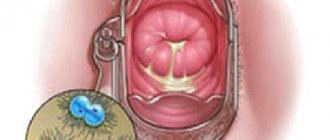Pain during urination causes a woman significant anxiety and discomfort. In most cases, pain is a sign that there are some problems with the genitourinary system. And this is a reason to contact a specialist who, through a thorough comprehensive examination, will be able to determine what is causing the problem and draw up a treatment plan.
The female body experiences this symptom more often than the male body. This is due to the structural features of the female body, as well as the hormonal changes occurring in the woman’s body. The female body is much more complex than the male body. Accordingly, girls are more at risk of certain diseases that require immediate treatment.
Cystitis and sex
If you had prolonged or too intense sexual contact, then after it you may experience a frequent urge to urinate and pain during it; these symptoms do not always indicate an infection. They often arise due to the fact that the bladder, and in particular the neck and urethra, become “irritated” due to mechanical stress.
If these symptoms do not subside within 24 hours, then you should collect a urine test, an average sample, and contact a specialized doctor for cystitis (urogynecologist, gynecologist, urologist) as a matter of urgency.
Causes of pain during urination
Pain when urinating, as in the beginning, often indicates urolithiasis. The symptom occurs when a stone passes through the urethra. The pain spreads to the lower abdomen and lumbar region. Another symptom may develop against the background of candidiasis (thrush).
A common cause of pain in men is phimosis, a narrowing of the foreskin of the head of the penis. This is due to the fact that before leaving the urethra, urine accumulates, which causes pain in the process of releasing urine in small portions.
Cystitis at any age
An acute attack of cystitis after sexual intercourse can occur at any age. Decades ago, when women maintained their virginity until marriage, cystitis that occurred after sexual intercourse was called the “honeymoon disease.”
At the present time, the fact is that no matter what your age, if the contact took place after a long break, the meeting was too active or sex happened with a new partner, you are not immune from the development of acute cystitis.
Causes of cystitis after sex
The main cause of inflammation of the bladder after sexual intercourse is a bacterial infection - the entry of pathogenic microorganisms into the female bladder.
Inflammation of the urinary tract after sexual intercourse can occur for several reasons, mainly anomalies of physiological development. In some women, the external opening of the urethra is located close to the opening of the vagina and bacteria easily enter the bladder.
Another cause of cystitis may be poor personal hygiene, both by women and men. Dirt and bacteria from the hands or genitals can enter the urinary system and cause inflammation.
In addition, the cause of the disease may be a combination of anal and vaginal sex in one sexual act. Among the bacteria that cause cystitis is E. coli, which, when it enters the urinary system, causes extremely unpleasant consequences. Up to 90% of cystitis is caused by the bacterium Escherichia coli, and movement during sex helps move this bacterium into the urethra and bladder.
Cystitis after sex can also develop due to sexually transmitted diseases, microflora disturbances in the vagina, and as a result, with inflammatory phenomena in the pelvic organs.
Any damage to the mucous membrane of the urethra during sexual activity gives rise to excessive proliferation of pathogenic microflora and the development of inflammatory processes. This is especially true if a woman has not had sex for a long time, sexual intercourse was prolonged and/or the woman’s vagina is poorly moisturized (dry, due to the lack of a sufficient amount of “natural” mucus).
Some women also find that certain sexual positions cause irritation and cystitis. Sex from behind, for example, is especially harmful for women who are prone to cystitis.
Prevention of painful urination in women
Preventive measures for painful urination in women include following simple rules that will help prevent the development of diseases of the urinary system:
- Get rid of bad habits. Smoking and frequent consumption of alcoholic beverages provoke the development of tumor processes and a decrease in the body's protective functions.
- Avoid hypothermia of the pelvic organs. The female reproductive system is extremely vulnerable in the cold season. With the onset of cold weather, you need to wear warm, waterproof shoes, and if water gets in, immediately change into dry shoes.
- Avoid swimming in bodies of standing water, even in hot weather. When the condition of the water even in a clean pool causes concern, water procedures should be canceled.
- Avoid injuries to the genitourinary organs. Ruptures of the mucous membranes of the external genitalia often cause irreversible inflammatory processes that become chronic.
- Have sex only with the use of contraception and be selective in your choice of sexual partners.
- Avoid contact with harmful toxic substances at work and at home. If possible, you should use a respirator or a cotton-gauze bandage.
- Wash underwear using phosphate-free powders and without bleaching effects. Chemicals tend to linger on tissues and cause severe irritation of the mucous membranes.
- Observe personal hygiene rules daily. In hot weather and after physical activity, wash the external genitalia at least twice a day.
- If you feel the urge to urinate, do not delay emptying your bladder for subjective reasons.
- Do not reduce the daily volume of fluid consumed. For an adult, it is from two to three liters per day.
- Have preventive examinations with a gynecologist twice a year.
- Eat well and strengthen your body.
If painful sensations appear when urine leaves the body, you should urgently seek advice from a specialist. This is especially true for women during gestation. Ignoring acute symptoms and self-medication can only lead to complications of inflammatory diseases and irreversible consequences.
Attention!
This article is posted for informational purposes only and under no circumstances constitutes scientific material or medical advice and should not serve as a substitute for an in-person consultation with a professional physician.
For diagnostics, diagnosis and treatment, contact qualified doctors! Number of reads: 5720 Date of publication: 07/26/2018
Urologists - search service and appointment with urologists in Moscow
The first signs of cystitis after sex
Cystitis after sex has several differences from acute cystitis. First of all, symptoms of the disease occur either in the first few hours or 1-2 days after intimacy.
The first symptoms are a frequent urge to urinate, which is accompanied by pain, burning, stinging, a feeling of incomplete emptying of the bladder, urine changes color and smell, and becomes cloudy. Body temperature may rise to subfebrile levels, pain or discomfort may appear in the lower abdomen and lumbar region. Some symptoms may be less severe or not appear at all.
Make an appointment
Make an appointment with a gynecologist by calling 8(812)952-99-95 or filling out the online form - the administrator will contact you to confirm your appointment
guarantees complete confidentiality
Diagnostics
The disease that causes pain when urinating can be diagnosed using a comprehensive examination.
Identification of all complaints during the initial examination. In addition to pain, it can be:
- false urge to urinate;
- hyperemia (redness) of tissues;
- itching;
- sleep disturbance;
- pathological vaginal discharge.
This examination can be carried out by a general practitioner. Having determined the medical history and received the results of a general blood test and a general urinalysis, the doctor will recommend contacting one (or more) specialized specialists:
- urologist;
- gynecologist;
- venereologist;
- infectious disease specialist;
- hematologist;
- immunologist;
- dermatologist;
- nutritionist;
- oncologist;
- traumatologist;
- neurologist.
Based on the medical history, the doctor may prescribe a number of laboratory and instrumental studies:
- Enzyme immunoassay (blood, amniotic fluid, cerebrospinal fluid). Refers to indirect methods for identifying the pathogen.
- PCR diagnostics (blood, urine, hair, urogenital smear, sputum, epithelium). PCR is the most reliable DNA method for the direct detection of infectious diseases. From the moment the material is taken for analysis until the result is obtained, 2-10 days pass.
- Analysis of a smear from the cervical canal for flora.
- Urinalysis according to Nichiporenko.
- Cystoscopy (examination of the bladder using a device equipped with a video camera).
- Urine culture for sterility.
- Ultrasound of the pelvis.
- X-ray or magnetic resonance imaging of the lumbosacral spine.
Complications and consequences of postcoital cystitis
Cystitis after sex is dangerous due to its complications, like any other inflammation.
If you ignore the first signs, the disease may develop into a more severe form that is more difficult to treat. Infection from the bladder can spread higher and provoke inflammatory kidney disease - pyelonephritis. In addition, if cystitis after sex occurs every time, a woman will eventually lose the desire to have sexual intercourse due to the fear of getting cystitis again, and this in turn leads to uncertainty, stress, disagreements between partners, etc.
Recently, self-medication has become widespread, and women who already know their problem can take a course of antibiotics immediately after sexual intercourse, but regular use of such drugs can cause other, more serious problems (in particular, uncontrolled use leads to drug resistance, i.e. e. antibiotics become powerless in the fight against pathogenic microorganisms).
In addition, antibiotic treatment is contraindicated during pregnancy, and cystitis in this situation can lead to miscarriage, premature birth, and cessation of fetal development. All experts agree that cystitis requires professional and complete treatment, otherwise not only physical problems are possible, but also psychological ones, both on the part of the woman and the family as a whole.
In response to inflammation, an admixture of blood may appear in the urine - hemorrhagic cystitis, and frequent episodes of inflammation lead to a chronic process with the involvement of deeper layers of the bladder wall in the inflammatory process, partial or complete destruction of the GAG layer (glycosaminoglycan layer) - a protective or barrier layer , which prevents the adhesion of bacteria to the bladder mucosa.
Risk factors
Urologists are aware of certain signs and primary diseases associated with dysuria. These forms of predisposition should be taken into account when conducting diagnostics.
Key risk factors:
- Female. The narrower and shorter urethra in women is more likely to be invaded by pathogenic microorganisms.
- Treatment of oncology with chemotherapy. Painful urination can be a side effect of cytotoxic and cytostatic drugs.
- Age from 45 years for men. In middle-aged and elderly patients, prostatitis or prostate adenoma is more often diagnosed.
- Using unsafe intimate hygiene products, getting soap or shower gel into the urethra.
- Allergic reactions to various substances and tissues that come into contact with the external genitalia.
- Impaired immune function, facilitating the invasion of pathogenic microorganisms into the organs of the genitourinary system.
- Long-term catheterization of the bladder.
- Recent diagnostic procedures, such as a urethral smear.
- Surgical interventions in the area of the external genitalia and bladder.
- Eating too spicy foods and coffee.
Discomfort when urinating, not accompanied by other symptoms, is often due to allergies and hygiene products.
Tests for diagnosing cystitis
If a urogynecologist diagnoses “postcoital cystitis” (or cystitis after sex), to confirm it, not only anamnesis and examination of the patient is required, but also additional examination.
First of all, analyzes are carried out:
- general blood test (the basis for diagnosing most diseases),
- general urinalysis (study of the chemical and physical properties of urine, which may indicate pathological processes in the body),
- urine culture - bacteriological examination (detects infection in the urinary tract and its sensitivity to antibiotics),
- vaginal smear (allows you to identify pathogenic bacteria and identify the inflammatory process).
Instrumental diagnosis of cystitis
Instrumental diagnostics, as the name suggests, is carried out using instruments. Cystitis after sex can be confirmed in the following ways:
- Kidney ultrasound
- Ultrasound of the bladder
- Ultrasound of the pelvic organs
- Cystoscopy of the bladder in women
Ultrasound examination to detect signs of inflammation in the bladder and kidneys, uterus and its appendages.
Cystoscopy is an examination of the urinary tract using a special optical system to determine the volume and depth of damage to the bladder mucosa. (more details...)
Physiology of urine output
Urination is necessary to remove unnecessary metabolic products and harmful chemical compounds from the body.
Urine itself is formed in the kidney tissue as a result of blood filtration: nephrons successively remove ballast substances from the blood vessels and return necessary components, such as proteins and salts, to the bloodstream. More than one hundred liters of primary urine can be formed per day, but as a result of final filtration, 800-1500 milliliters of liquid per day are removed from the body. The excretory fluid formed in the kidneys penetrates into other parts of the excretory system for accumulation and gradual removal from the body. Approximately 500 ml of urine can be deposited in the bladder, and a person begins to feel the need to urinate when a quarter of the organ’s volume is filled. The signal received from the brain relaxes the sphincter and promotes the removal of fluid from the body through the urethra. In men, part of the urethra passes through the prostate gland, so prostate pathologies can cause dysuria.
Differential diagnosis of cystitis
Differential diagnosis consists of excluding diseases that are characterized by similar symptoms.
For example, if there are signs of cystitis (painful and frequent urination, changes in urine composition, etc.) and high fever, then this condition may be caused by inflammation of the renal pelvis, not the bladder, and the presence of blood or pus in the urine may be caused by the presence of stones in the urinary tract.
If cystitis after sex bothers you for a long time and is difficult to treat, you should undergo a full examination; perhaps the reasons lie in the presence of other diseases - for example, an active viral infection, sexually transmitted diseases, etc.
Signs of cystitis that are not confirmed by the presence of bacteria in the urine may be associated with a fairly common female disease - cystalgia. The disease occurs exclusively among the female population, characterized by frequent and painful urination and pain in the lower abdomen. Cystalgia has not been fully studied, but, according to some data, it is associated with hormonal disorders and circulatory disorders due to pathological processes in the pelvic organs.
When making a diagnosis, the urogynecologist relies on the patient’s complaints and the results of the examination.
Why does the urethra hurt, burn and itch?
It’s rare that any girl can say that she has never had pain when urinating in her life. Of course, the more predisposing factors, the greater the chances of developing urethritis. Among these, gynecologists distinguish:
* Hypothermia. * Beginning of sexual activity. * Violent sexual intercourse. * Sexual infections and venereal diseases. * Errors in diet (spicy, sour, etc.). * Gynecological diseases. * Vaginal flora disorders. * Urolithiasis disease. * Medical procedures on the urethra. * Decreased immunity. * Toxic and radiation damage.
Symptoms of urethritis in women
Common complaints are white or mucous discharge from the urethra in the morning, itching, pain and stinging when urinating, “it hurts to pee.” Urethritis in women can occur without discharge from the canal, only with unpleasant sensations. With this disease, as a rule, there are no general inflammatory symptoms - there is no increase in body temperature or general weakness. However, this does not mean that the disease does not need to be treated and that “everything will go away on its own.”
How the disease develops.
Infection of a woman most often occurs during sexual contact with a sick person. Urethritis can occur without pronounced manifestations, unnoticeably, and the patient himself may not know that he is sick. So, we got a pathogen in the vagina. It constantly enters the urethra and causes chronic inflammation. As long as the immunity of the urethral wall copes with the situation, no symptoms of the disease arise. With regular intimacy, a more intense reflux of microflora into the urethra occurs and, in addition, sexual intercourse itself is a considerable burden for it. Therefore, exacerbations of urethritis are almost always associated with sexual activity, its activity and intensity. Symptoms of the disease may not appear immediately after intercourse, but after some time (for nonspecific bacterial urethritis - from several hours to several days or weeks), which is called the incubation period.
Chronic urethritis
The inflammatory process of the urethra is an insidious disease that often goes unnoticed and treatment requires considerable effort.
This greatly complicates its timely diagnosis, because Patients sometimes come to the gynecologist late, when the process has already entered the chronic stage and it is painful for a woman to “go to the toilet a little” and has already become habitual. Symptoms and signs of chronic urethritis appear in women more often as follows:
- the frequency of the urge to urinate increases,
- the interval between trips to the toilet decreases,
- a woman feels a burning sensation and pain in the urethra, in the lower abdomen,
- Purulent and bloody discharge may come from the urethra.
Relapse is caused by hypothermia or excessive consumption of alcoholic beverages. Under the influence of harmful effects, all the symptoms of primary acute infection gradually resume. Possible and frequent complications of chronic urethritis are the same urogenital diseases that are among its possible causes, namely cystitis, salpingitis, prostatitis and balanoposthitis (in men), pyelonephritis, etc. With a long course against the background of fibrous scarring of the walls of the inflamed In the urethra, a stricture (pathological narrowing of the lumen of the urethra), chronic pelvic pain syndrome, and ectopic pregnancy in women can form. We should not forget that urethritis, or rather its causes, often begins with both female and male infertility...
Frequent urge to run to the toilet “little by little”?
Why do women often start running to the toilet due to the unbearable urge to “pee”?
Which can cause a strong desire to be near a bathroom. Find out more about bladder inflammation and what to do about it using the links below! assignment_ind
About cystitis in women
access_time
Register online
Tests for urethritis
Diagnostics carried out in women before treatment are aimed at identifying the pathogen. Therefore, to determine the cause of urethritis, tests are of paramount importance. The gynecologist usually prescribes the following for women who have pain in peeing:
- Gram microscopy of urethral smear;
- bacterial culture of discharge from the urethra and/or vagina in order to detect the microbe and perform an antibiotic sensitivity test;
- PCR tests for “hidden infections”,
- bacteriological culture of urine,
- general urine analysis.
You can read about these methods of laboratory diagnosis of urethritis, find out the list of tests and the address of the laboratory at the link “Where to get tested in Moscow.”
Diagnosis of urethral inflammation
Examination before treatment
| Research | Prices |
| Smear microscopy | 550 |
| Purity Analysis | 650 |
| Gram smear | 750 |
| Culture of urethral microflora | 1 750 |
| PCR tests | 450 |
| General urine analysis | 450 |
| Taking material | 450 |
Treatment of cystitis after sex
Treatment is both symptomatic and etiotropic in nature (i.e., eliminating the cause of the disease).
For example, the presence of inflammation in the vagina is eliminated with the help of local antifungal and antibacterial drugs. If a sexually transmitted disease is detected, a specialist requires treatment of both partners. If there are anatomical features of the urinary system, the urogynecologist may recommend surgical treatment - urethral transfer, i.e. transposition of the urethra (higher above the vagina), if necessary, the surgeon excises the remains of the hymen, which “stretch” the urethra.
After surgery, recovery takes 7-15 days; in 85% of cases, the operation allows you to forget forever what cystitis after sex is.
Treatment
Since burning in the urethra is only a possible symptom of a pathological condition, the patient needs treatment for the root cause of the unpleasant sensation. Depending on the diagnostic results, the urologist may prescribe surgical or therapeutic treatment.
Possible methods:
- The use of antibiotics to combat bacterial infections. The selection of effective drugs using a test for the sensitivity of microflora to antibiotics improves the prognosis.
- The use of anti-inflammatory drugs, antispasmodics and painkillers.
- A surgical intervention aimed at restoring the patency of the urinary tract, eliminating the source of purulent infection or removing a tumor. Stone removal can be done using minimally invasive procedures.
- A therapeutic diet for diseases of the excretory system, such as urolithiasis and inflammation of the kidney tissue.
In case of an acute infectious process, the patient will require hospitalization.
Medications
The main treatment for postcoital cystitis is primarily aimed at blocking the spread of infection. Antibacterial therapy helps with this.
The main treatment of cystitis is supplemented with medications that help reduce the unpleasant manifestations of the disease and normalize the functioning of the urinary system - painkillers, herbal medicines, immunostimulants, vitamin complexes.
In the treatment of inflammatory processes in the bladder, the administration of anti-inflammatory drugs through the urethra into the bladder (instillation) is often used.
Cystitis after sex with proper treatment and following all the doctor’s recommendations goes away within a week, but immunostimulating drugs, herbal medicines and vitamins should be taken longer (2-3 weeks).
With this disease, it is extremely important to complete the full course of therapy, otherwise cystitis will become chronic, and treatment of chronic pathology will be much more difficult.
Treatment of painful urination in women
Treatment begins immediately after receiving the results of all prescribed diagnostic procedures. As the infection progresses, broad-spectrum antibiotics are used until the results of bacterial culture of urine are obtained and the susceptibility of the microflora is determined.
Since antibiotics are being taken, we must not forget about adding probiotics and symbiotics to avoid dysbiosis of the mucous membranes. Any prescriptions for pregnant women should be made with extreme caution. Some drugs are contraindicated during gestation and lactation, since lactobacilli and bifidobacteria in their composition can provoke increased fermentation and aggravate allergic reactions in the digestive system.
To reduce body temperature and acute pain, non-steroidal anti-inflammatory drugs are prescribed. As soon as the acute phase passes, physiotherapeutic procedures and vitamin therapy are added. Most physiotherapeutic procedures are contraindicated for pregnant patients.
Infectious diseases of internal organs indicate a weak immune system. Persons with weakened protective functions of the body need, in addition to the main therapy aimed at overcoming infection in the body, to take additional medications:
- immunomodulators;
- vitamin complexes;
- microelements;
- biostimulants.
Vaginal suppositories help achieve the expected result. The constituent components of vaginal suppositories relieve inflammation, inhibit pathogenic infections and increase the body's protective functions. In the pharmacy chain you can buy candles made from sea buckthorn oil, aloe extract, alfalfa, chamomile flowers, calendula flowers, and sophora.
Apply candles at night, and in the morning remove the remains with warm running water. The external genitalia are then wiped with a napkin made of natural fabric. In acute forms of the disease, suppositories are placed every four hours.
Folk remedies for treating painful urination provide good results, but only in cases where they are clearly agreed upon with the attending physician.
In case of diseases of the urinary system, it is extremely important to follow a nutritional diet. You will have to give up the following types of products:
- acute;
- smoked;
- fried;
- salty;
- sweet flour;
- fast foods;
- strong tonic drinks;
- sweet carbonated drinks.
The food consumed should be rich in plant fiber, vitamins and microelements. Dishes made from animal protein should be consumed in moderation with vegetable salads. Fermented milk products will have a beneficial effect on the functioning of the intestines, which will become indispensable for dysbiosis and taking antibiotics. Along with this, enterosorbents are drunk, which quickly remove decay products and suppressed pathogenic flora from the walls of the mucosa. This helps to avoid intoxication of the body and increased stress on the urinary system.
If urolithiasis is confirmed, you will have to be patient and follow all the doctor’s recommendations. Some types of kidney stones can be dissolved and removed from the body naturally. Also, maintaining a stable drinking regime normalizes the electrolyte balance in the body. The following drinks that can be prepared at home will be useful:
- dried fruit compotes;
- fruit jelly;
- juices from vegetables and fruits without added sugar;
- herbal teas;
- infusion of rose hips;
- vitamin fruit drinks.
An excessively frequent urge to urinate can be caused by:
- hot chocolate;
- cocoa;
- coffee;
- strong black tea;
- factory-produced juices.
The pelvic organs “love” dry heat. If possible, during the cold season, it is advisable to additionally warm up the lumbar region and wear warm clothes. Such procedures must be coordinated with a specialist.
Traditional treatment
Traditional medicine is used to remove inflammatory processes in the bladder, and this is only possible after prior consultation with a specialist. One of the most common methods in folk medicine is to use a heating pad or hot bottle. Yes, there really is relief, but! only for a while, because the cause has not been eliminated, and the bacteria in the bladder has not disappeared.
It is worth remembering that cystitis after sex requires an integrated approach and should include the use of antibiotics, antispasmodics, uroseptics and other medications.
It is important to follow a home regime, diet and drink plenty of fluids. So cold, the use of cold drinks, caffeine, and spicy foods aggravate the symptoms of the disease.
Other symptoms
Burning during urination is rarely the only symptom of a disease of the genitourinary system. As a rule, patients complain of other unpleasant sensations associated with the functions of the kidneys, bladder and genitals. Isolated dysuria may indicate the absence of infection.
Additional signs:
- discomfort in the pubic area, perineum and lower back;
- bleeding in the urine (hematuria);
- increased body temperature;
- nausea and vomiting;
- discharge of cloudy fluid from the urethra;
- decreased libido;
- weak stream when urinating;
- soreness of the skin in the area of the external genitalia;
- unpleasant odor in urine;
- false urge to defecate;
- fatigue and weakness.
Prolonged fever, accompanied by difficulty urinating, indicates the development of a dangerous infection.
Surgical treatment of cystitis
Cystitis after sex is treated mainly with therapeutic agents; surgical treatment may be required to change physiological developmental abnormalities, for example, when the urethra is located close to the vagina, which leads to trauma to the canal and the rapid spread of infection into the bladder. During the operation, the surgeon moves the opening of the urethra to the desired location. After surgical treatment there are almost no complications and the problem of cystitis after sexual intercourse for women in 85% of cases remains a thing of the past.
Causes of painful urination in pregnant women
Pregnant women experience hormonal variability, which leads to changes in the functioning of the entire body. The mucous membranes are the first to react to the concentration of hormone levels in the blood. Epithelial tissues may experience:
- dryness;
- swelling;
- redness;
- itching;
- tingling;
- burning;
- increased production of mucous secretion.
Also, when the balance of hormones is disrupted, a woman’s genitourinary system becomes more vulnerable to pathogenic infections. Therefore, cystitis becomes a common occurrence in pregnant women. Stagnant urine in the bladder provokes the proliferation of pathogenic bacteria and microorganisms.
The next stage is urogenital candidiasis. Candida fungus in moderate quantities is a component of the normal microflora of the genital mucosa. Hormonal imbalance leads to rapid proliferation of Candida and colonization of the entire vaginal cavity. The infection spreads along an ascending path, covering new areas of the genitourinary system. Candidiasis manifests itself as painful sensations in the urethra and cervical canal. The increasing itching turns into a burning sensation, which becomes increasingly difficult to tolerate over time without proper therapy.
Painful urination in pregnant women can be the consequences of sexually transmitted infections before conception. Sexual relationships with infected partners, as well as untreated sexually transmitted diseases from the past, “wake up” from the remission phase and begin to worry with renewed vigor. Complications of sexually transmitted diseases may appear years later.
In women during gestation, the excretory system is actually subject to a double load, which is difficult to cope with even with healthy organs. This is how isolated urinary syndrome manifests itself in pregnant women, when protein, red blood cells and white blood cells appear in a urine test.
If conception occurs in a woman who previously suffered from chronic renal failure, then her life may be in danger of serious complications. In particular, in the early stages this can lead to miscarriage, and in the later stages - to gestosis.
During pregnancy, during urination, painful sensations may be observed at the end of urine output. During normal development of the embryo, the size of the uterus increases, over time beginning to exert strong pressure on neighboring organs. The bladder, located close to the uterus, experiences constant discomfort. In the later stages of gestation, during urination, a woman may notice a feeling of incomplete emptying of the bladder and a weakening of the pressure of the stream. Gynecologists consider such symptoms to be acceptable at the end of the third trimester.
Prevention
- As a preventative measure, both partners should be sure to maintain good hygiene.
- Partners should avoid sexual positions that create pressure or friction on the urethra, as well as intense tempos.
- It is necessary to use special lubricants (lubricants) in case of natural deficiency of vaginal mucus.
- Provide timely treatment for gynecological diseases.
- Do not use spermicides or vaginal diaphragms for contraception.
- It is recommended to empty the bladder immediately after sexual intercourse, this allows you to “evacuate” most of the bacteria that have entered the bladder.
- Immediately after contact, drink at least 300 ml of liquid.
Causes of pain during urination associated with other body systems
- Tumors – benign and malignant, in the organs of the urinary system or nearby organs. Pain occurs due to mechanical compression of the ureter and bladder. Relief of the condition in this case depends on the method of treating the tumor.
- Gout is a rheumatological disease in which uric acid salts are deposited in the joints. The kidneys and urinary system are often affected. In this case, not only pain is observed, but also a burning sensation when urinating.
- Complications after diseases not related to the urinary system. These include sinusitis, all types of sore throats, flu, intestinal diseases, pathological changes in teeth and other inflammatory diseases of organs and systems.










